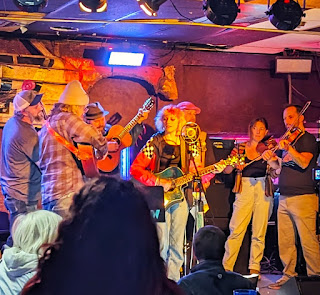After Beth Watts Nelson and Kelly Hunt finished an expansive dust devil performance of Hunt’s song “Clouds,” Nelson said, “That song is so fun. I wish it could go on 15 minutes.”
It could have last night without anyone minding. Hunt’s
meditation plays like an anthem to possibility and the navigation necessary to achieve it. (Imagine Janelle
Monae’s “Tightrope” laced through and shaped by the mirages of western Kansas.)
Nelson and
Hunt both have big visions, as declared on both of Hunt’s gemstone LPs (one
stark meditations on hard country, Even the Sparrow, and the other a sweeping epic set against the same
hard country background, Ozark Symphony) and Nelson’s Little Miss Dynamite, a record that does
Brenda Lee proud by playing like an energetic, all-encompassing conversation with
a friend: it could go all night while feeling like a bright second.
Though I
would love to see variations on this Nelson/Hunt show most any night over the coming years,
I know diverse collaboration is core to both artists. What I’ll get instead are a series
of unpredictably brilliant mandalas each time they play. Still, what’s remarkable
about the two together is how well the blend serves both. Last night, Hunt had the opportunity to
shape that alternate universe she creates every time she sings, and Nelson radiated (in sound and motion) the power of play.
That doesn’t mean the lightness of touch or of heart could be confused with anything lightweight. We start with dark truths and move outward here. When Nelson sang her, “Late Night Mama Blues,” you would not have been wrong to keep an eye on its sharp edge. Kindly, she dedicated it to the “dads, too” since this one felt it deep.
If I had to pick, I’d say my favorite genre
of music is the riot act, where someone (usually a woman)
lays someone else out (usually a man). There’s a lot to learn from those songs.
They’ve been a north star to me for years. In this case, Nelson confronts the
kids, and it says something to me that I’ve never heard anyone go quite to this place before,
certainly not so winningly. The key thing is I’d want to be this Mama’s son or daughter.
A specific
manifestation of what made this show so great was the way each of these artist’s
sounds blended into something new that you did not want to go away. Hunt is a
bit of a rocker, in the very best sense, and her music wants to charge across
the wilds of America in search of promised lands, or even a little hope. Nelson
gets it... and she wants to chase those same horizons, but she wants to be there when that kid comes hangdogging in the door, too.
Since I’ve been writing about music, I’ve been known (to the extent I’m known) for my focus on women’s voices (and maybe Springsteen, but, face it, this is a guy whose defining hit was a rocked-up girl group single). People sometimes ask me why. And in these days of identity, I could be asked “Why” as an accusation. The early answer was “because no one else is writing about this.” The latter answer is not that different. I write about what I hear that a) excites me and b) I fear others are missing. It often has ties to race, class, and gender, and sometimes sexuality. The thing about riot acts is they offer the medicine you need--not necessarily what you want.
Nelson and Hunt exemplify what I hear in women that I don’t hear as often from men. Nelson never forgets the importance of community, and Hunt never forgets our connection to history. These are Realist focal points, not so much Romantic (although there is romance in each of these artist’s approaches, part of why you want to sing along).Hunt’s closer before Nelson’s final song ("No Goodbye") was something I’ll call “Dreams.” It’s a song about making sure dreams matter. That distinction has everything to deal with reckoning with our grasp on reality. A small part of what made this set by Nelson and Hunt so powerful (the scope of the human heart makes up the rest) was its ability to reckon with hard realities and the infinite abilities that lie in our consciousness. Music is a sure sign these poles don't want to be that far apart. If we could come together the way Nelson and Hunt play double banjo, we could solve every important question facing our world today, and, no, I'm not just saying that.
Thank you,
Beth Watts Nelson, and thank you Kelly Hunt.










.jpg)
.jpg)























